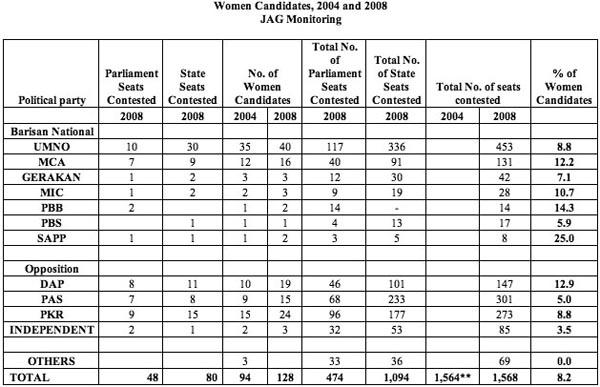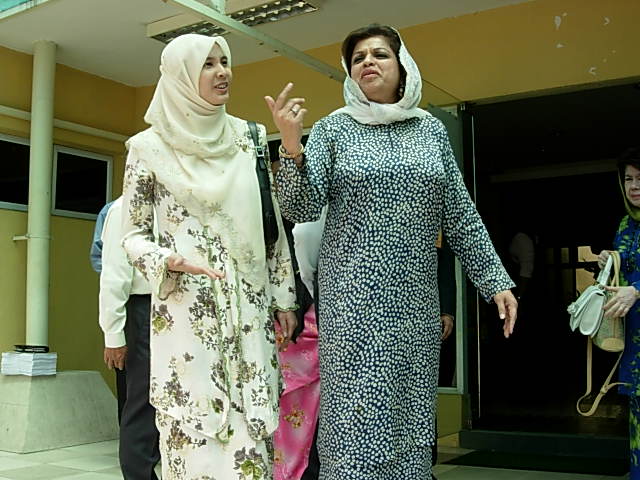By Maria Chin Abdullah
WOMEN’s representation in this 2008 election continues to be less than satisfactory with the percentage falling short of the 30% quota set for women to be in decision-making positions. There is an improvement in the absolute number of women candidates, increasing from 94 in 2004 to 128 in 2008, out of a total of 1,568 contested seats. However, the marginal increment of 2.2% is still abysmal (6% in 2004 to 8.2% in 2008).
The figures below are from the Joint Action Group for Gender Equality (JAG) and it shows the dismal performance of political parties.

Source: various newspapers, NST, The Star, theSun, 25 Feb 2008. NST, **25 March 2004. Online website: www.thestar.com.my/election/results/candidates.html (2008)
Some observations can be made:
1. The marginal increment of women in politics shows that more effort is definitely required from political parties. A policy to promote the 30% quota has, in fact, been set in place in Chapter 13 of the Ninth Malaysia Plan (2006 – 2010) and is also a commitment echoed by the Prime Minister.
2. Sexist Member of Parliament (MP) for Jasin, Datuk Mohamad Said Yusuf, has been dropped from the 2008 elections. This is indeed a victory for women’s groups who have campaigned against sexism and discrimination in Parliament. But there are other sexist offenders who have been renominated:
Datuk Bung Mokhtar Radin (BN-Kinabatangan)
Datuk Mohamed Aziz (BN-Sri Gading)
Datuk Badruddin Amiruldin (BN-Jerai)
Datuk Idris Haron (BN-Tangga Batu)
Datuk Seri S. Samy Vellu (BN-Sungai Siput)
Raja Datuk Ahmad Zainuddin Raja Omar (BN-Larut)
Dr Mohamad Hayati Othman (PAS-Pendang)
Salahuddin Ayub (PAS-Kubang Kerian)
Shabudin Yahaya (BN-Permatang Berangan)
Datuk Jasmin Mohamad (BN-Sungai Dua)
Deputy Speaker Datuk Muhamad Abdullah
Datuk Wan Junaidi Tuanku Jaafar (BN-PBB-Santubong)
Abdul Fatah Harun (PAS-Rantau Panjang)
The first five MPs are those who have repeatedly used sexist language in Parliament. The continued nomination of these 13 sexist MPs is an indication that politicians do not have high regard for their voters, despite strong protests from the public about their sexist antics.
3. Women candidates are being pitted against one another, especially in Bukit Bintang (Carol Chew from MCA and Teresa Kok from DAP); Lembah Pantai (Datuk Seri Shahrizat Abdul Jalil from Umno and Nurul Izzah Anwar from Parti Keadilan Rakyat or PKR; and Bukit Lanjan (Yong Dai Ying from Gerakan and Elizabeth Wong from PKR). Not only are women being fielded against other women but new candidates are contesting against strong incumbents.
It is unfortunate that political parties view this as a “sexy” election strategy. This gives voters the false hope and impression that political parties are championing for women’s rights and equality. Yet if we assess their performance for this election, they have hardly achieved the 30% mark.
4. Women candidates are placed in “difficult” seats and these are not winnable seats, especially when they are contesting against “giants”. Given the many obstacles women face in the political arena, it is not just about increasing the number of women candidates but making sure these women win. Most of these women candidates are contesting for the first time and are armed with very little experience to deal with the challenges of the elections.
5. Women candidates have been portrayed in the media as either young against the old (Nurul Izzah and Shahrizat) or as service-only MPs (Datin Paduka Chew Mei Fun and Theresa Kok). This tends to belittle the issues that they represent which are not featured well by the media.  6. PAS has also jumped onto the bandwagon and fielded more women candidates, from only nine candidates in 2004 to 15 candidates in the 2008 elections. Out of which, seven women are contesting for Parliamentary seats as opposed to only one woman for Parliament in 2004.
6. PAS has also jumped onto the bandwagon and fielded more women candidates, from only nine candidates in 2004 to 15 candidates in the 2008 elections. Out of which, seven women are contesting for Parliamentary seats as opposed to only one woman for Parliament in 2004.
However, numbers are still not the only effective indicator of women in politics. Women’s participation has to go beyond numbers and move towards a qualitative transformation of women in shaping national decision-making processes. The barriers faced by women have to be understood and resolved by political parties.
Still Uneven Playing Field
The above statistics show that a good number of women candidates will not win because of the odds against them. It will not be surprising to find that there is no significant change in the percentage of women either at the state assembly or parliamentary levels in the 2008 election.
Statistics by the Inter-Parliamentary Union show Malaysia’s rank has dropped from 72nd place (out of 181) to 104th (out of 188) countries in representation of women in the Lower and Upper House of Parliament. The Asean average is 14.6%; Malaysia’s is 10.5%. Asean Countries like Indonesia, Thailand and Philippines all rank higher than Malaysia despite their lower economic standing.
Women still lack confidence as a result of years of social conditioning that defines their rightful place first and foremost in the domestic sphere – as mothers, not as breadwinners and citizens. Politics has been painted as a man’s world, one in which women will not last, let alone make an impact. Sexist attitudes as shown by male parliamentarians are good enough barriers to deter women’s participation. Yet such disrespect for women is sanctioned by the state as these sexist MPs are again nominated as candidates for another five-year term.
Women, when elected, enter into a patriarchal parliamentary setup which curbs women’s autonomy to raise women’s concerns. Their inability to cross party lines and vote according to their conscience on gender, justice and democracy issues is a major problem, linked to a culture that does not encourage critical thinking. An experience of the women’s group with the Gender Caucus is an example, where the Chair of the Gender Caucus was only willing to meet the women’s groups provided she got “permission” from Datuk Sri Mohamed Nazri Abdul Aziz, Chair of the Human Rights Caucus.
The absence of local council elections also deprives women of an important venue for political involvement. Women may have more courage and interest in local-level decision making. After all, this is the level where their most immediate concerns lie: personal safety, transport and road conditions, water and sanitation, and so on.
Inequalities in the public arena often start with discriminatory attitudes, practices and unequal power relations between women and men within the family, community and the public. At the end of the day, women’s rights to participatory democracy need to be defined as a dynamic process, which is integral to and inseparable from all efforts that promotes a healthy and sustainable nation.
Maria Chin Abdullah has long been involved with the women’s movement and is actively working for women and human rights in Malaysia. She helped set up Pusat Janadaya (Empower) which is a member of JAG.